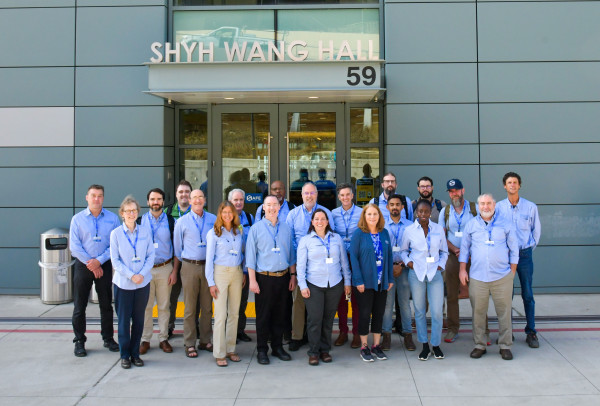The U.S. National Science Foundation has awarded Trusted CI, the NSF Cybersecurity Center of Excellence, a five-year, $6-million per-year award to run through September 2029. Lawrence Berkeley National Laboratory (Berkeley Lab) will now serve as Trusted CI’s central steward.
Trusted CI empowers trustworthy discovery and innovation funded by NSF by partnering with research cyberinfrastructure (CI) operators to build and maintain effective cybersecurity programs that secure the progress of NSF-funded research. The center started in 2012 and consists of a multi-institutional, cross-functional team that addresses the complex challenges facing NSF’s cyberinfrastructure research ecosystem.
The cornerstone of the center is the Trusted CI Framework, which guides research institutions in launching and maintaining cybersecurity programs. Trusted CI hosts the annual NSF Cybersecurity Summit, hosts webinars, assesses the assurance of software developed for use in research computing, runs Fellows and students programs to enable cybersecurity workforce development, and engages with research cyberinfrastructure operators designing and constructing new facilities on “secure-by-design” approaches. Trusted CI has helped research CI operators at over 547 NSF Science Directorate projects including all NSF Major Facilities and numerous NSF Major Facilities under construction (MREFCs).
The center continues to thrive because of ongoing collaborations with leaders from multiple institutions. Indiana University and the University of Illinois Urbana-Champaign (UIUC) have previously helmed the center (2022 through 2024). The UIUC has now passed the baton to Berkeley Lab, which will now facilitate the center’s activities. “Berkeley Lab also has a very long history of collaboration with NSF science,” says Trusted CI Director and PI Sean Peisert of Berkeley Lab’s Scientific Data Division, “including contributions to ATLAS at CERN, IceCube, the Rubin Observatory (née LSST), and DESI among other joint DOE/NSF efforts.”
Trusted CI staff span seven institutions, including Berkeley Lab, Arizona State University, Indiana University, the National Center for Supercomputing Applications at the University of Illinois Urbana-Champaign, the Pittsburgh Supercomputing Center, University of Wisconsin-Madison, and the Sustainable Horizons Institute.
With this renewal, Trusted CI will accommodate a rapidly growing community need by supporting regulated research. Trusted CI will expand with the addition of NSF’s successful Regulated Research Community of Practice (RRCoP). RRCoP’s inclusion expands Trusted CI’s reach into research institutions with more than 300 higher education institutions participating from every state.
With NSF’s support, Trusted CI will address pressing national cybersecurity workforce development needs. Trusted CI’s Fellows Program trains and empowers scientific community members with basic cybersecurity knowledge to support their professional development. Going forward, Trusted CI will expand the Fellows program, develop a new Students program, and in both cases, invite participation from the missing millions in traditionally-underserved communities, and leverage partnerships with the Sustainable Horizons Institute (SHI) and the NSF-funded Minority-Serving Cyberinfrastructure Consortium (MS-CC). Trusted CI will also work with these partners to host “regional summits” to engage with Minority Serving Institutions (MSIs). Additionally, with support from the LBNL IDEA Office, Trusted CI will establish a center-wide inclusivity, diversity, equity, and accountability (IDEA) program to comprehensively guide Trusted CI in its activities. Trusted CI is also pleased to have Dr. Damian Clarke of Alabama State University as Special Advisor for Trusted CI’s Diversity Efforts.
The NSF award will also support expansion of the Trusted CI Framework and augmentation of its “Ambassador” program with NSF Major Facilities with “residencies” — ongoing, deep engagements with NSF Major Facilities that monitor and sustain improvements over time. It also supports development of new materials. In response to a 2021 Trusted CI study that discovered that most NSF Major Facilities develop software without software assurance processes, Trusted CI plans to create a Software Assurance Framework (SAF) and a SAF Implementation Guide (SAFIG) to provide clear direction to organizations developing software on the processes necessary to achieve those minimum standards.
To learn more about the Trusted CI Framework, the NSF Cybersecurity Summit, regional Summits, and Trusted CI’s other activities and resources, please read this expanded announcement and learn more on Trusted CI’s website.
About Computing Sciences at Berkeley Lab
High performance computing plays a critical role in scientific discovery. Researchers increasingly rely on advances in computer science, mathematics, computational science, data science, and large-scale computing and networking to increase our understanding of ourselves, our planet, and our universe. Berkeley Lab’s Computing Sciences Area researches, develops, and deploys new foundations, tools, and technologies to meet these needs and to advance research across a broad range of scientific disciplines.
About Computing Sciences at Berkeley Lab
High performance computing plays a critical role in scientific discovery. Researchers increasingly rely on advances in computer science, mathematics, computational science, data science, and large-scale computing and networking to increase our understanding of ourselves, our planet, and our universe. Berkeley Lab's Computing Sciences Area researches, develops, and deploys new foundations, tools, and technologies to meet these needs and to advance research across a broad range of scientific disciplines.


